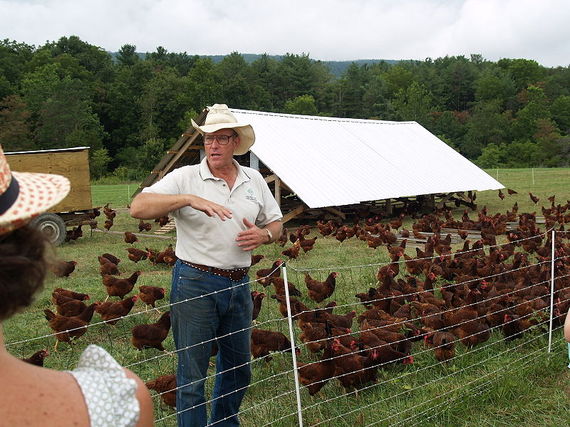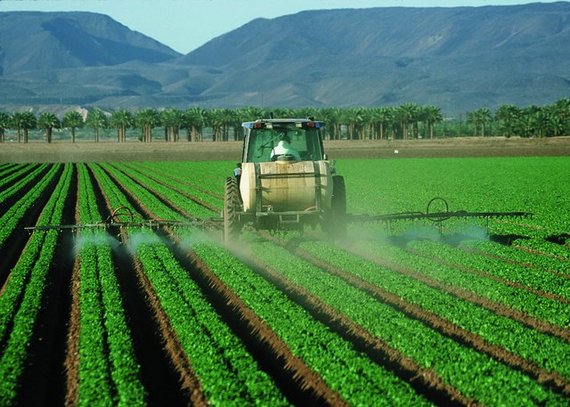
Organic farmer Joel Salatin gives a tour of Polyface Farm, in Virginia. He stands inside electric netting surrounding a flock of laying hens and their portable coop, dubbed an Eggmobile.
Credit: nick v from washington dc/ https://www.flickr.com/people/54418876@N00/
https://commons.wikimedia.org/wiki/File:Joel_Salatin_in_front_of_hens.jpg
Recent polling indicates that Americans are more worried about chemicals in food than they are about added sugar, saturated fat, and sodium. Accordingly, food companies are removing some of the chemicals that consumers find objectionable, on health or environmental grounds. In another recent example of policy change in response to public sentiment, the U.S. Environmental Protection Agency voided its approval of the herbicide Enlist Duo, in response to a lawsuit by environmental organizations over concerns for endangered species.
Food is the basic way we fit into the web of life. We make choices about what to eat several times each day, day after day, over our lifetime. The impacts of those choices add up massively. By choosing organically grown food, we can take good care of ourselves and our environment. But when we opt for "conventionally," or industrially, grown food, we can harm ourselves and our environment.
Industrial agriculture uses pesticides, inorganic fertilizers, antibiotics, hormones, genetically modified organisms (GMOs), and other manufactured inputs. Organic producers instead apply compost, cover crops such as winter rye, and other organic materials to keep soil--and the plants and animals that grow from the soil--healthy. They also use management techniques such as crop rotation and companion planting.

Bird-friendly shade-grown coffee in Guatemala
Credit: John Blake/https://commons.wikimedia.org/wiki/File:Shade_grown_coffee_in_Guatemala.jpg
Unfortunately, organic growing methods minimize but do not completely eliminate pesticides, antibiotics, administered hormones, GMOs, and other problematic inputs from food. Amendments allowed on organic fields include manure from industrially raised animals and wood ash that contains radioactive cesium-137 released from nuclear weapons and nuclear reactors and taken up by trees. In addition, pesticides and GMO seeds and pollen from industrial fields may drift to organic fields. Still, eating organic goes a long way toward reducing contaminants in our food.
Organic Farming Is Conventional Farming
Our ancestors practiced organic agriculture for 12,000 years before the advent of chemically intensive industrial agriculture of large monoculture crops, which developed in the decades following World War II. Negative effects of industrial agriculture have become increasingly apparent--among them, soil degradation, "superweeds" and "superbugs" that adapt to whatever pesticides we throw at them, and elevated greenhouse gas emissions. Truly, it is organic farming, not industrial farming, that should be considered conventional. Industrial agriculture deliberately uses synthetic poisons on our food and genetically engineers our food by mixing genes of different species together, practices that should seem pretty crazy to consumers. By these measures, industrial farming should even be considered reckless.

Pesticides for our salad
Credit: Jeff Vanuga/Photo Courtesy of USDA Natural Resources/ https://commons.wikimedia.org/wiki/File:NRCSAZ02083_-_Arizona_(449)(NRCS_Photo_Gallery).jpg
How Eating Organic Benefits Us
- Compared with industrial food, organic food is more nutritious and better tasting.
- Organic food reduces our exposure to synthetic pesticides, which have been implicated in chronic diseases ranging from cancer to diabetes, neurodegenerative disorders such as Parkinson's and Alzheimer's diseases, birth defects, reproductive disorders, respiratory diseases such as asthma, cardiovascular diseases, kidney diseases, and autoimmune diseases such as lupus erythematous and rheumatoid arthritis. Humans are genetically similar to other living things. Considering that we share half of our genes with fruit flies, it should be no surprise that pesticides harm people as well as pests. U.S industrial agricultural workers are especially at risk, suffering 10,000 to 20,000 physician-diagnosed pesticide poisonings each year.
- It helps address the growing problem of antibiotic-resistant microorganisms and preserve the effectiveness of antibiotics for curing infections. Each year in the U.S., at least 2 million people become infected with bacteria that are resistant to antibiotics and at least 23,000 of them die as a direct result of these infections. Industrial agriculture not only routinely doses animals with antibiotics but also uses antibiotics on some vegetable and fruit crops.
- It protects consumers from a host of other potentially dangerous unknowns that are not allowed in organic agriculture. These include GMOs, which are typically grown with heavy pesticide applications; administered hormones, which have been linked to cancer; and synthetic food additives such as "natural flavorings," which may be harmful or untested. The sewage sludge spread to fertilize some industrial farm fields can contain harmful heavy metals and synthetic chemicals that find their way into foods.
- Organic growing is the only way to feed the world sustainably, according to a United Nations report.
- Buying organic food increases demand for it, which brings prices down so others who are less affluent can afford to eat cleaner food.

Would you give a child industrial-raised cow's milk to drink if you knew it could contain as many as 20 drugs and hormones, including antibiotics, painkillers, steroid and sex hormones, and anti-inflammatory and antifungal drugs?
Credit: Cindy Kalamajka/http://www.freeimages.com/photo/fast-food-kid-1531111
How Eating Organic Benefits Our Environment
- Organic growing reduces plants' and animals' exposure to synthetic pesticides, which harm soil organisms, beneficial insects, plants, birds, frogs, and a host of other animals. This includes pollinators such as butterflies and bees, upon which we utterly depend for our food supply. It also reduces plants' and animals' exposure to GMOs, antibiotics, and hormones.
- It helps stabilize the climate. Organic farming generates only half the greenhouse gas emissions of industrial agriculture per unit of land area. Organic growing doesn't use inorganic fertilizers and synthetic fertilizers and pesticides, which can require a lot of energy to manufacture. Organic growing methods also retain and store more carbon in the soil. In fact, organic farming can be done in such a way that it stores even more carbon in soil than it emits. Furthermore, organic farming can yield as much food per acre as industrial farming, a conclusion supported by a University of California at Berkeley meta-analysis of 115 studies.
- It maintains soil health. Industrial agriculture often results in reduced agricultural productivity due to nutrient depletion, organic matter losses, erosion, and compaction. Because organic farm fields are amended with more organic matter, the soil holds moisture better, requires less irrigation water, and is more drought resistant.
- It keeps groundwater and surface water freer of pesticides, chemical fertilizers, and other synthetic chemicals. A major problem with industrial fertilizers is that they create dead zones in the oceans at mouths of rivers where oxygen is depleted and higher life forms, such as seafood species, can't survive. The dead zone at the mouth of the Mississippi River is the size of New Jersey.
- Farm animals experience a markedly better life. Unlike in industrial operations, antibiotics can't be administered to organically raised animals to compensate for overcrowded and filthy living conditions. Organic growing practices are better for wildlife species too, not only protecting them from synthetic chemicals but also preserving more natural habitats such as wetlands and fencerows.
- It preserves genetic varieties. The U.S. has lost 93 percent of its agricultural genetic diversity over the last 80 years, as a handful of industrial agricultural corporations have taken increasing control of our seed supply. Organic producers strive to maintain food species diversity by planting different varieties, making our food system more resilient in the face of stresses such as climate change.
Why Not Eat Organic Food?
Organic food costs more in the short-term. However, organic food may cost less in the long-term by reducing lifetime health care costs. Coping with any of the illnesses linked to pesticides--such as cancer or Parkinson's disease--costs money for medical services and time lost from work, not to mention potentially reduced quality and quantity of life. Many people don't eat organic food simply because they don't have access to it, particularly in "food deserts," which are urban neighborhoods or rural towns without ready access to fresh food.
To be the best we can be, we should eat the best food we can--starting with cleaner ingredients that don't wreck the planet on which our food is grown--or the people growing it.
Ellen Moyer, Ph.D., P.E., is an independent consultant dedicated to remediating environmental problems and promoting sustainable practices to prevent new problems. You can connect with her on LinkedIn and Facebook or find more information or sign up for updates on her website.
